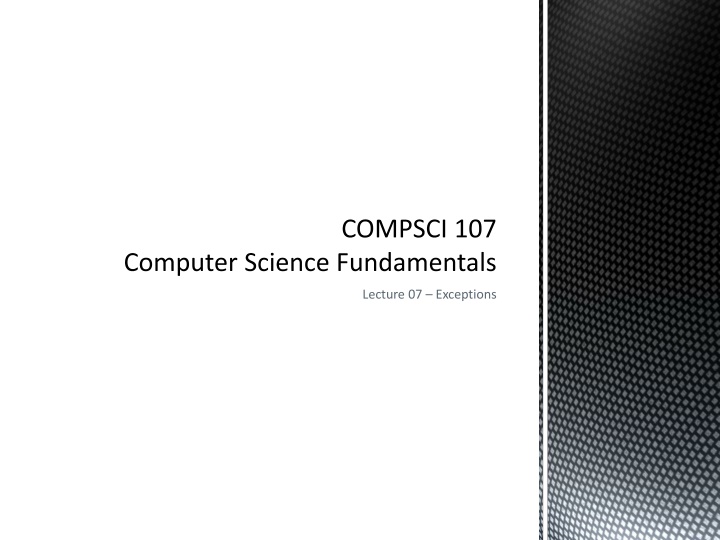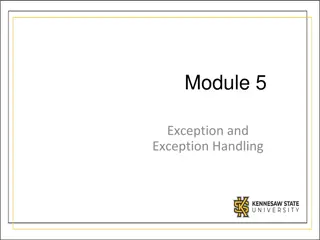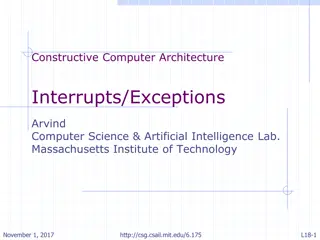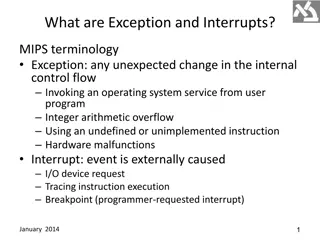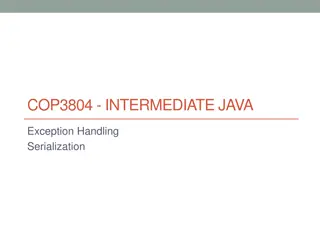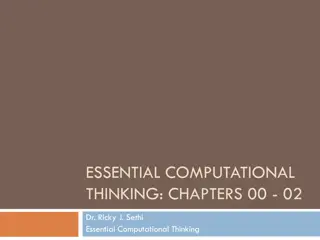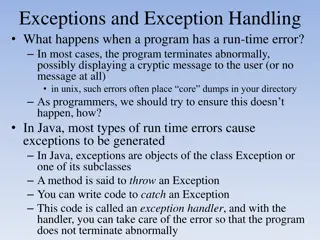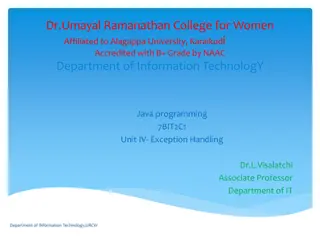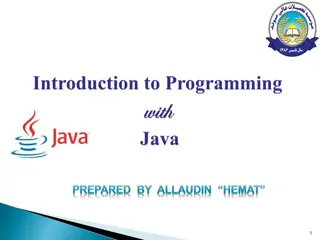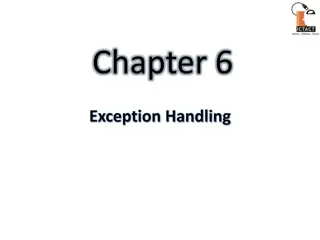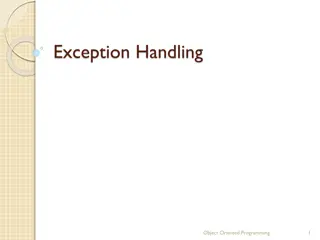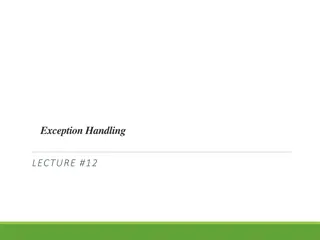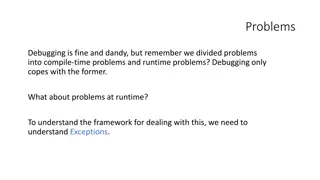Handling Exceptions in Computer Science Fundamentals
In this lecture on exceptions, you will learn about handling unexpected input values in code through examples of divide by zero errors and input errors. The flow of control with try, except, and finally statements will be explored, along with generating and catching appropriate exceptions to gracefully manage runtime errors. Enhance your coding skills by understanding how to effectively utilize exceptions in your code.
Download Presentation

Please find below an Image/Link to download the presentation.
The content on the website is provided AS IS for your information and personal use only. It may not be sold, licensed, or shared on other websites without obtaining consent from the author.If you encounter any issues during the download, it is possible that the publisher has removed the file from their server.
You are allowed to download the files provided on this website for personal or commercial use, subject to the condition that they are used lawfully. All files are the property of their respective owners.
The content on the website is provided AS IS for your information and personal use only. It may not be sold, licensed, or shared on other websites without obtaining consent from the author.
E N D
Presentation Transcript
COMPSCI 107 Computer Science Fundamentals Lecture 07 Exceptions
Learning outcomes Understand the flow of control that occurs with exceptions try, except, finally Use exceptions to handle unexpected runtime errors gracefully 'catching' an exception of the appropriate type Generate exceptions when appropriate raise an exception COMPSCI 107 - Computer Science Fundamentals 2
Example Typical code with no errors def divide(a, b): result = a / b return result x = divide(5, 5) print(x) COMPSCI 107 - Computer Science Fundamentals 3
Handling unexpected input values What if the function is passed a value that causes a divide by zero? Error caused at runtime Error occurs within the function Problem is with the input What can we do? def divide(a, b): result = a / b return result x = divide(5, 0) print(x) COMPSCI 107 - Computer Science Fundamentals 4
Divide by zero error Check for valid input first Only accept input where the divisor is non-zero def divide(a, b): if b == 0: result = 'Error: cannot divide by zero' else: result = a / b return result x = divide(5, 0) print(x) COMPSCI 107 - Computer Science Fundamentals 5
Handling input error Check for valid input first What if b is not a number? def divide(a, b): if (type(b) is not int and type(b) is not float): result = "Error: divisor is not a number" elif b == 0: result = 'Error: cannot divide by zero' else: result = a / b return result x = divide(5, 'hello') print(x) COMPSCI 107 - Computer Science Fundamentals 6
Handling input error Check for valid input first What if a is not a number? def divide(a, b): if (type(b) is not int and type(b) is not float or type(a) is not int and type (a) is not float): result = ('Error: one or more operands' + ' is not a number') elif b != 0: result = a / b else: result = 'Error: cannot divide by zero' return result x = divide(5, 'hello') print(x) COMPSCI 107 - Computer Science Fundamentals 7
try Code that might create a runtime error is enclosed in a try block Statements are executed sequentially as normal If an error occurs then the remainder of the code is skipped The code starts executing again at the except clause The exception is "caught" try: statement block statement block except: exception handling statements exception handling statements COMPSCI 107 - Computer Science Fundamentals 8
Alternative method of handling input error Assume input is correct Deal with invalid input an an exceptional case def divide(a, b): try: result = a / b except: result = 'Error in input data' return result x = divide(5, 'hello') print(x) COMPSCI 107 - Computer Science Fundamentals 9
Exercise What is the output of the following? def divide(dividend, divisor): try: quotient = dividend / divsor except: quotient = 'Error in input data' return quotient x = divide(5, 0) print(x) x = divide('hello', 'world') print(x) x = divide(5, 5) print(x) COMPSCI 107 - Computer Science Fundamentals 10
Danger in catching all exceptions The general except clause catching all runtime errors Sometimes that can hide problems def divide(dividend, divisor): try: quotient = dividend / divsor except: quotient = 'Error in input data' return quotient x = divide(5, 2.5) print(x) COMPSCI 107 - Computer Science Fundamentals 11
Specifying the exceptions Can choose to catch only some exceptions def divide(a, b): try: result = a / b except TypeError: result = 'Type of operands is incorrect' except ZeroDivisionError: result = 'Divided by zero' return result x = divide('hello', 0) print(x) COMPSCI 107 - Computer Science Fundamentals 12
Exceptions Any kind of built-in error can be caught Check the Python documentation for the complete list BaseException +-- SystemExit +-- KeyboardInterrupt +-- GeneratorExit +-- Exception +-- StopIteration +-- ArithmeticError | +-- FloatingPointError | +-- OverflowError | +-- ZeroDivisionError +-- AssertionError +-- AttributeError +-- BufferError +-- EOFError +-- ImportError +-- LookupError | +-- IndexError | +-- KeyError +-- MemoryError +-- NameError | +-- UnboundLocalError +-- OSError | +-- BlockingIOError | +-- ChildProcessError | +-- ConnectionError | | +-- BrokenPipeError | | +-- ConnectionAbortedError | | +-- ConnectionRefusedError | | +-- ConnectionResetError | +-- FileExistsError | +-- FileNotFoundError | +-- InterruptedError | +-- IsADirectoryError | +-- NotADirectoryError | +-- PermissionError | +-- ProcessLookupError | +-- TimeoutError +-- ReferenceError +-- RuntimeError | +-- NotImplementedError +-- SyntaxError | +-- IndentationError | +-- TabError +-- SystemError +-- TypeError +-- ValueError | +-- UnicodeError | +-- UnicodeDecodeError | +-- UnicodeEncodeError | +-- UnicodeTranslateError COMPSCI 107 - Computer Science Fundamentals 13
Some other useful techniques raise Creates a runtime error by default, the most recent runtime error try: statement block here except: more statements here (undo operations) raise raise Error('Error message goes here') raise ValueError("My very own runtime error") COMPSCI 107 - Computer Science Fundamentals 14
Exercise Given the following function that converts a day number into the name of a day of the week, write code that will generate an informative exception if the name is outside the desired range. def weekday(n): names = ['Sunday', 'Monday', 'Tuesday', 'Wednesday', 'Thursday', 'Friday', 'Saturday'] return names[n] COMPSCI 107 - Computer Science Fundamentals 15
Example Given the following function that converts a day number into the name of a day of the week, write code that will generate an informative exception if the name is outside the desired range. def weekday(n): if n not in range(0, 8): raise ValueError('Data must be between 0 and 7 inclusive') names = ['Sunday', 'Monday', 'Tuesday', 'Wednesday', 'Thursday', 'Friday', 'Saturday'] return names[n] COMPSCI 107 - Computer Science Fundamentals 16
Exercise Modify the following function that calculates the mean value of a list of numbers to ensure that the function generates an informative exception when input is unexpected def mean(data): sum = 0 for element in data: sum += element mean = sum / len(data) return mean COMPSCI 107 - Computer Science Fundamentals 17
Some other useful techniques finally Executed after the try and except blocks, but before the entire try-except ends Often used with files to close the file try: statement block here except: more statements here (undo operations) finally: more statements here (close operations) else Executed only if the try clause completes with no errors try: statement block here except: more statements here (undo operations) else: more statements here (close operations) COMPSCI 107 - Computer Science Fundamentals 18
Example try: file = open('test.txt') file.write('Trying to write to a read-only file') except IOError: print('Error: cant find file or read data') else: print("Written content in the file successfully") finally: file.close() COMPSCI 107 - Computer Science Fundamentals 19
Exercise What is the output of the following program when x is 1, 0 and '0'? try: print('Trying some code') 2 / x except ZeroDivisionError: print('ZeroDivisionError raised here') except: print('Error raised here') raise else: print('Else clause') finally: print('Finally') COMPSCI 107 - Computer Science Fundamentals 20
Summary Exceptions alter the flow of control When an exception is raised, execution stops When the exception is caught, execution starts again try except blocks are used to handle problem code Can ensure that code fails gracefully Can ensure input is acceptable raise Creates a runtime exception finally Executes code after the exception handling code COMPSCI 107 - Computer Science Fundamentals 21
